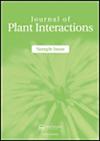Halotolerant endophytes promote grapevine regrowth after salt-induced defoliation
IF 3.3
3区 生物学
Q2 PLANT SCIENCES
引用次数: 0
Abstract
ABSTRACT Salinity is an important problem for agriculture in the Mediterranean area, and thus, it is essential to develop mitigation strategies to reduce its impact. The main objective of this study was to test the effectiveness of halotolerant plant growth-promoting bacteria (H-PGPB) in improving grapevine salt stress tolerance. Grapevines grafted onto a salt-sensitive rootstock were inoculated with a consortium of H-PGPB. The substrate of half of the plants of each treatment was salinized up to 2 dS m−1. Plants grew for six days under these conditions, and afterward, NaCl was removed to assess plant recovery through growth, physiology, and canopy temperature measurements. Inoculation with H-PGPB had a positive effect on plant physiology, but after salt treatment, grapevines stopped their photosynthetic metabolism, leading to severe defoliation. Remarkably, after salt stress removal, inoculated plants re-sprouted faster, demonstrating that H-PGPB inoculation could be a good practice to increase vineyard resilience to salt stress.耐盐内生菌促进盐诱导落叶后葡萄的再生
本文章由计算机程序翻译,如有差异,请以英文原文为准。
求助全文
约1分钟内获得全文
求助全文
来源期刊

Journal of Plant Interactions
PLANT SCIENCES-
CiteScore
5.30
自引率
6.20%
发文量
69
审稿时长
>12 weeks
期刊介绍:
Journal of Plant Interactions aims to represent a common platform for those scientists interested in publishing and reading research articles in the field of plant interactions and will cover most plant interactions with the surrounding environment.
 求助内容:
求助内容: 应助结果提醒方式:
应助结果提醒方式:


